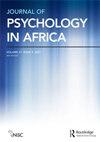Intergroup emotions and intergroup attitudes in post-apartheid South Africa
IF 0.8
4区 心理学
Q3 PSYCHOLOGY, MULTIDISCIPLINARY
引用次数: 0
Abstract
This article investigates the relationships among intergroup emotions and intergroup attitudes among three South African ethno-linguistic groups. The sample included 1 658 respondents (350 Afrikaans-speaking white South Africans; 526 English-speaking white South Africans; and 782 black South African respondents). They completed surveys on intergroup attitudes and group-based emotions of pride, anger, disgust, fear, pity and envy. Multiple linear regression analyses were employed to investigate predictors of outgroup attitudes. The results indicate that attitudes of younger black South Africans were more negative towards Afrikaans-speaking white South Africans. Ingroup pride predicted more positive outgroup attitudes for all groups. Disgust predicted the more negative outgroup attitudes for all groups, while anger predicted more negative white South Africans’ attitudes towards black South Africans. Fear was negatively associated with black South Africans’ attitudes towards English-speaking white South Africans, while outgroup pity predicted more positive white South Africans’ attitudes towards black South Africans and black South Africans’ attitudes towards English-speaking white South Africans. The study confirms tenets of intergroup emotion theory that intergroup emotions serve a regulating function in intergroup attitudes and behaviour.种族隔离后南非的群体间情绪和群体间态度
本文研究了三个南非民族语言群体的群体间情绪和群体间态度之间的关系。样本包括1658名受访者(350名讲南非荷兰语的南非白人;526名说英语的南非白人;782名南非黑人受访者)。他们完成了关于群体间态度和群体情感的调查,包括骄傲、愤怒、厌恶、恐惧、怜悯和嫉妒。多元线性回归分析外群体态度的影响因素。结果表明,年轻的南非黑人对说南非荷兰语的南非白人的态度更为消极。群体内自豪感预示着所有群体的群体外态度都更积极。厌恶预示着所有群体更消极的外群体态度,而愤怒预示着南非白人对南非黑人更消极的态度。恐惧与南非黑人对说英语的南非白人的态度呈负相关,而外群体同情则预示着南非白人对南非黑人和南非黑人对说英语的南非白人的态度更为积极。本研究证实了群体间情绪理论的原则,即群体间情绪对群体间态度和行为具有调节作用。
本文章由计算机程序翻译,如有差异,请以英文原文为准。
求助全文
约1分钟内获得全文
求助全文
来源期刊

Journal of Psychology in Africa
PSYCHOLOGY, MULTIDISCIPLINARY-
CiteScore
1.70
自引率
16.70%
发文量
62
期刊介绍:
Findings from psychological research in Africa and related regions needs a forum for better dissemination and utilisation in the context of development. Special emphasis is placed on the consideration of African, African-American, Asian, Caribbean, and Hispanic-Latino realities and problems. Contributions should attempt a synthesis of emic and etic methodologies and applications. The Journal of Psychology in Africa includes original articles, review articles, book reviews, commentaries, special issues, case analyses, reports and announcements.
 求助内容:
求助内容: 应助结果提醒方式:
应助结果提醒方式:


